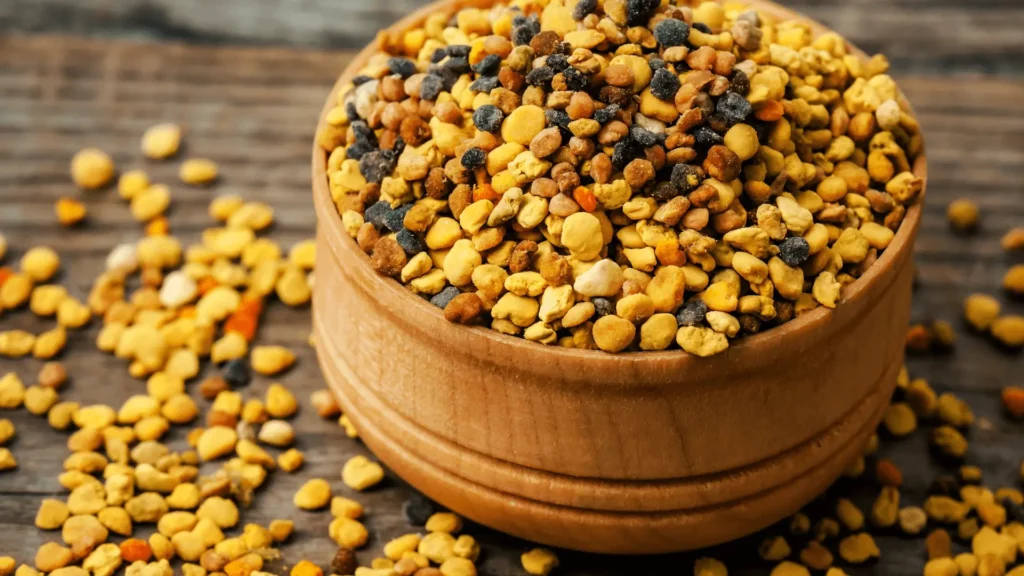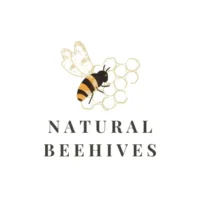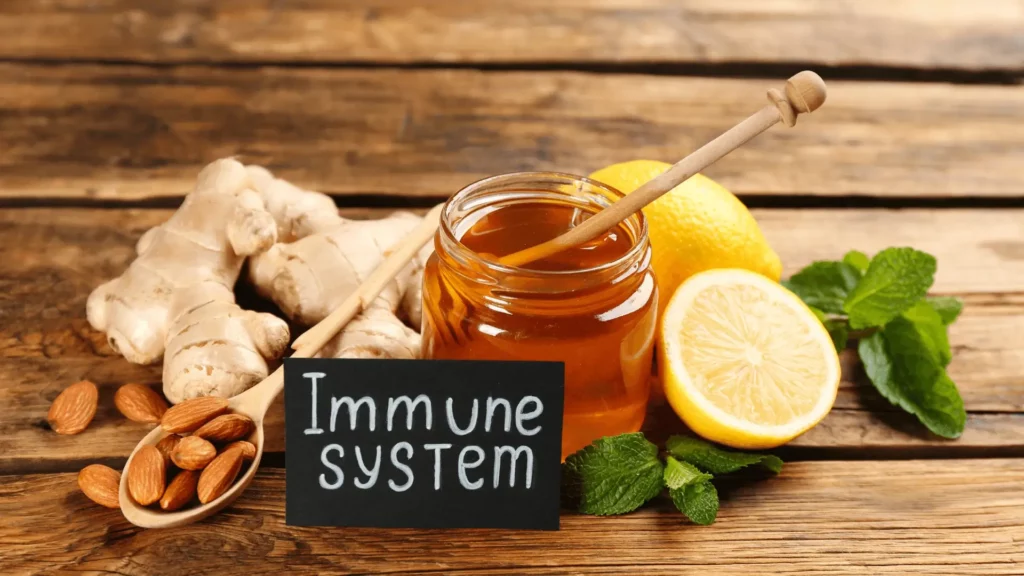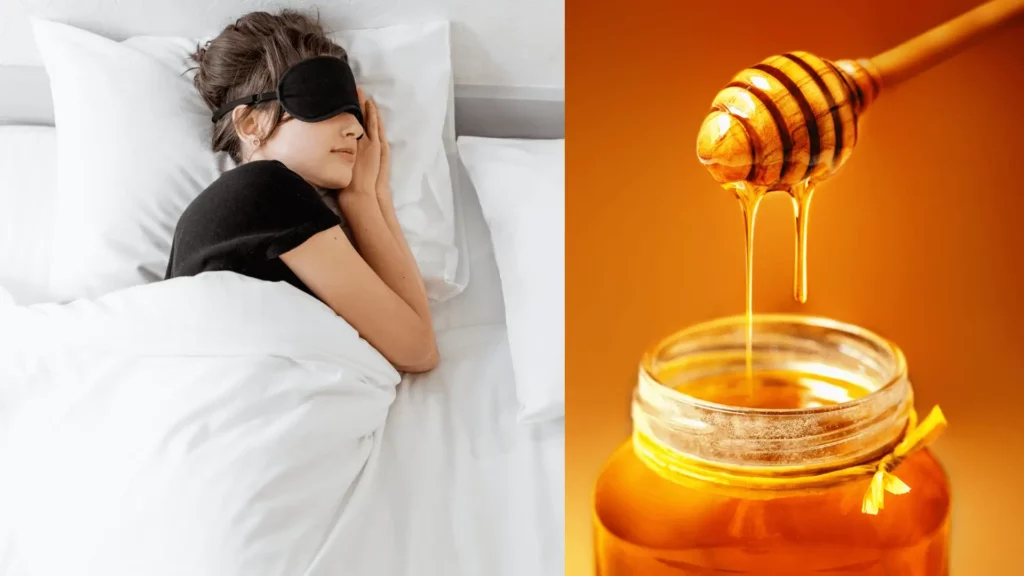
Have you ever wondered how nature’s superfood, bee pollen, can help unlock a world of health benefits? From boosting your immune system to supporting weight loss, this tiny granule is hailed as a nutritional powerhouse. But with so much information out there, it’s easy to get overwhelmed. That’s where we come in.
In this informative article, we’ll dive deep into the wonders of bee pollen and explore its potential impact on your health. We’ll break down the benefits, discuss the right dosage, and highlight the essential nutrition it provides. Worried about allergies? We’ve got you covered with tips on how to use bee pollen safely. Plus, we’ll share some delicious recipes and creative ways to incorporate bee pollen into your daily routine.
Whether you’re seeking fertility support or looking to boost your energy levels, bee pollen has something for everyone. So keep reading as we uncover the secrets of nature’s superfood and learn how bee pollen can revolutionize your well-being.
Introduction to Bee Pollen
Bee pollen, often referred to as nature’s superfood, is a tiny granule collected by bees from the stamen of flowering plants. For centuries, bee pollen has been utilized in traditional medicine for its potential health benefits. It is renowned for its rich nutritional composition and the unique compounds it contains.
Historically, bee pollen has been used in various cultures, including ancient Chinese medicine and Egyptian remedies. It has been praised for its energizing and rejuvenating properties. However, in recent years, the interest in bee pollen has gained momentum as more people recognize its potential impact on overall health.
Bee pollen is packed with a diverse range of nutrients, including vitamins, minerals, proteins, and antioxidants. It contains essential amino acids and is considered a complete protein source. Moreover, bee pollen is abundant in bioactive compounds like flavonoids, phenolic acids, and enzymes, which contribute to its health-promoting effects.
As we delve deeper into the benefits and uses of bee pollen, you’ll discover its potential to support the immune system, provide relief from allergies, enhance energy levels, and even offer potential fertility benefits. Keep reading to explore the numerous advantages this natural superfood can offer.
Also read: Uncover the Amazing Benefits of Avocado Raw Honey
The Nutritional Composition of Bee Pollen
Bee pollen is a small, yet remarkable, natural substance that packs a powerful nutritional punch. With its rich composition of vitamins, minerals, proteins, and antioxidants, it’s no wonder that bee pollen is gaining recognition as a superfood.
Here are some key components found in bee pollen:
1. Vitamins: Bee pollen contains a wide range of essential vitamins, including vitamin A, vitamin B complex (such as B1, B2, B3, and B5), vitamin C, vitamin D, vitamin E, and vitamin K. These vitamins play vital roles in maintaining overall health and supporting various bodily functions.
2. Minerals: Bee pollen is abundant in minerals like calcium, magnesium, iron, zinc, potassium, selenium, and phosphorus. These minerals are crucial for maintaining strong bones, promoting healthy metabolism, supporting nerve function, and boosting the immune system.
3. Proteins: Bee pollen contains a significant amount of proteins, including essential amino acids. These proteins are the building blocks of our bodies and are essential for the growth, repair, and proper functioning of cells and tissues.
4. Antioxidants: Bee pollen is brimming with antioxidants, which help protect our bodies against the damaging effects of free radicals. Antioxidants play a vital role in reducing inflammation, supporting the immune system, and preventing chronic diseases.
In addition to these essential nutrients, bee pollen also contains unique bioactive compounds, such as flavonoids and phenolic acids, that contribute to its potential health benefits.
Remember to source high-quality bee pollen from reputable suppliers to ensure its purity and potency. Incorporating bee pollen into your diet can be a delicious and convenient way to boost your nutritional intake and support overall health.
Also read: The Benefits of Raw Buckwheat Honey: A Complete Guide
Health Benefits of Bee Pollen
Bee pollen, often referred to as nature’s superfood, offers a wide array of health benefits. This tiny granule packs a powerful punch when it comes to enhancing overall well-being. Here are some of the key health benefits associated with consuming bee pollen:
Immune System Support
Bee pollen contains a rich blend of vitamins, minerals, and antioxidants, all of which work together to boost the immune system. By strengthening the body’s natural defenses, bee pollen helps to ward off illnesses and infections, keeping you healthier and more resilient.
Allergy Relief
Contrary to its name, bee pollen has been found to alleviate allergy symptoms in some individuals. It acts as a natural desensitizer, gradually reducing sensitivity to common allergens. By incorporating bee pollen into your diet, you may experience relief from bothersome allergies.
Improved Energy Levels
Thanks to its abundance of nutrients, bee pollen is known for its energizing properties. It provides a natural and sustainable source of energy, making it an ideal supplement for athletes or those in need of an extra vitality boost.
Potential Fertility Benefits
Bee pollen has been associated with potential fertility benefits for both men and women. The nutrient-rich composition of bee pollen supports reproductive health, aiding in hormone balance and promoting reproductive organ function.
To fully reap the health benefits of bee pollen, it is recommended to start with a small dosage and gradually increase it over time. As always, it is advisable to consult with a healthcare professional before incorporating any new supplement into your routine.
Remember, bee pollen is a powerful natural substance, but it may not be suitable for everyone. If you have pollen allergies or a known sensitivity to bee products, it is essential to exercise caution and seek medical guidance.
Also read: Unraveling the Secrets of Sunflower Honey
Potential Side Effects and Allergic Reactions
When it comes to bee pollen consumption, it’s important to be aware of potential side effects and allergic reactions that can occur. Although rare, some individuals may experience adverse effects from bee pollen. Allergic reactions are the most significant concern, especially for those with pollen or bee-related allergies. Symptoms can range from mild to severe, including itching, swelling, hives, difficulty breathing, and even anaphylaxis.
To mitigate these risks, it’s crucial to start with small amounts of bee pollen and gradually increase the dosage. This allows your body to adapt and reduces the likelihood of adverse reactions. It’s also recommended to consult with a healthcare professional before incorporating bee pollen into your diet, especially if you have a known allergy or any underlying medical conditions.
By taking precautionary measures and being mindful of your body’s response, you can safely enjoy the potential health benefits of bee pollen.
How to Incorporate Bee Pollen into Your Diet
Incorporating bee pollen into your daily diet is a great way to harness its nutritional benefits. Here are some practical tips to help you incorporate bee pollen seamlessly:
1. Add it to Smoothies:
Boost the nutritional value of your smoothies by sprinkling a teaspoon of bee pollen into the blender. It adds a delightful texture and enhances the flavor profile of your favorite smoothie recipes.
2. Sprinkle it over Salads:
Elevate the nutritional content of your salads by sprinkling bee pollen on top. It provides a crunchy texture and a hint of sweetness that complements fresh greens and other salad ingredients.
3. Mix it with Honey:
Create a delicious and nutritious combination by mixing bee pollen with honey. Spread it on toast, drizzle it over yogurt, or use it as a natural sweetener in your tea.
Remember to start with small quantities of bee pollen and gradually increase the dosage to assess your tolerance. Also, ensure you source high-quality bee pollen from reputable suppliers.
Also read: The Most Expensive Honeys You Won’t Believe Exist
Tips for Buying and Storing Bee Pollen
When it comes to buying and storing bee pollen, there are a few key factors to keep in mind to ensure you’re getting a high-quality product that maintains its freshness and potency. Here are some tips to guide you:
Selecting High-Quality Bee Pollen:
1. Source: Look for bee pollen sourced from reputable beekeepers who prioritize the health and welfare of their bees. Organic and locally-produced options are often preferred.
2. Purity: Check for purity labels or certifications to ensure the bee pollen is free from contaminants and additives.
3. Color and Texture: Opt for vibrant-colored and granulated bee pollen, avoiding clumpy or discolored batches.
4. Smell: Fresh bee pollen should have a natural, sweet scent reminiscent of flowers and honey.
Proper Storage Techniques:
1. Cool and Dry: Store bee pollen in an airtight container in a cool, dark, and dry place, away from direct sunlight and moisture.
2. Avoid Heat Exposure: Bee pollen is sensitive to heat, so avoid storing it near ovens, stoves, or other sources of warmth.
3. Refrigeration Option: If you live in a particularly warm climate, consider refrigerating your bee pollen to extend its shelf life.
4. Usage within Timeframe: Use bee pollen within the recommended timeframe mentioned on the packaging to ensure optimal freshness and effectiveness.
Remember, by following these buying and storing tips, you can enjoy the full benefits of bee pollen while ensuring its quality and potency.
Also read: Enhance Your Recipes with Bee Honey Powder – Nature’s Sweet Delight
Final Thoughts
Bee pollen is a remarkable natural superfood with numerous potential health benefits. Throughout history, bee pollen has been used in traditional medicine for its various healing properties. Today, there is a growing interest in bee pollen due to its rich nutritional composition. Packed with vitamins, minerals, proteins, and antioxidants, bee pollen offers a unique combination of essential nutrients. It has been associated with immune system support, allergy relief, improved energy levels, and potential fertility benefits. However, it’s important to be aware of potential side effects and allergic reactions. By carefully incorporating bee pollen into your diet and following proper storage techniques, you can harness the power of this tiny granule for optimal health and well-being.



